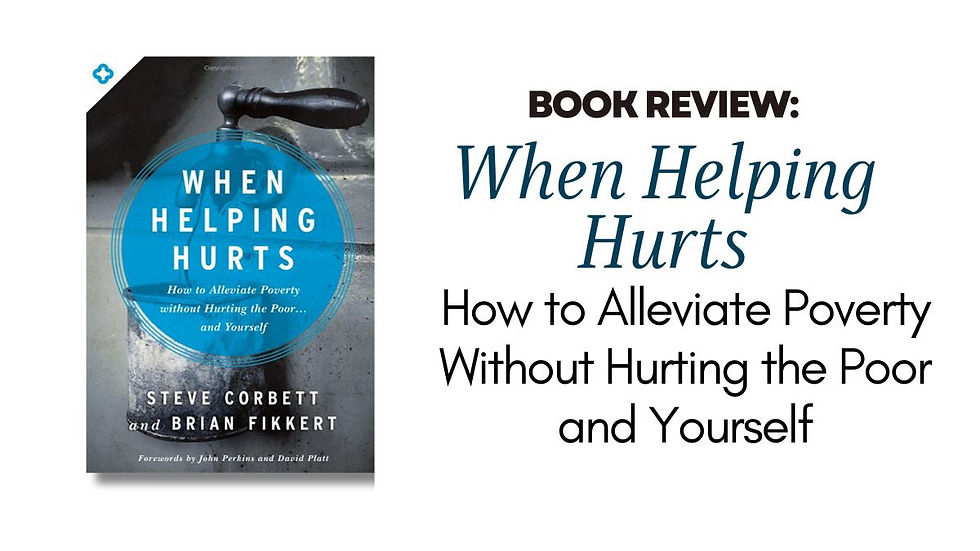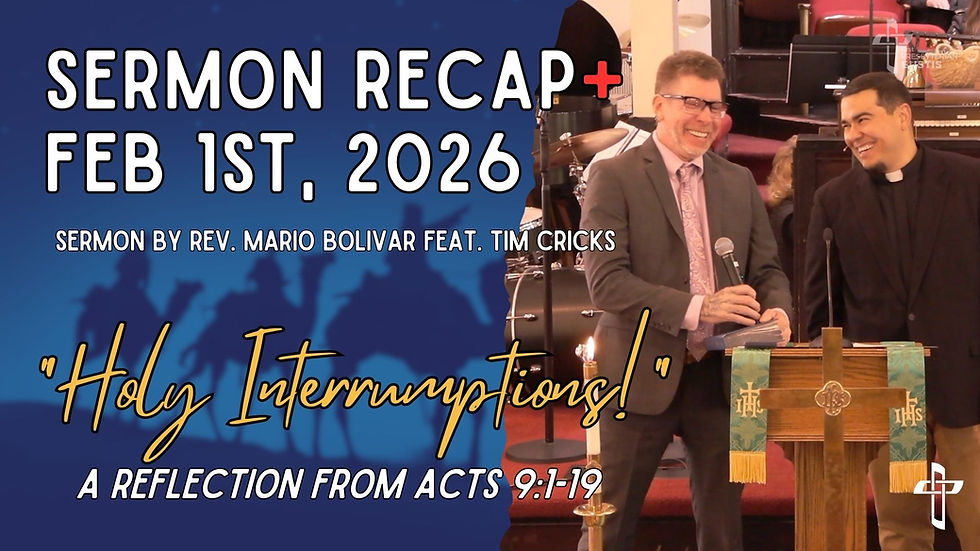When Helping Hurts
- Mario Bolivar
- Apr 29, 2025
- 4 min read
I recently finished a truly eye-opening book titled When Helping Hurts: How to Alleviate Poverty Without Hurting the Poor . . . and Yourself by Steve Corbett and Brian Fikkert. As I read, I couldn't help but reflect on how the book challenges our approach to poverty and how it can guide us in our quest for deeper discipleship. This book isn't just about money—it's about how we, as a Church, view and engage with the brokenness around us.
I believe its core arguments could shape a powerful sermon series for us, as we dig deeper into God’s call to care for the poor, the marginalized, and those facing every kind of poverty.
Let me know if you might find that helpful or at the very least interesting...
So, let me share a little feedback and how the lessons I learned can be incredibly useful in todays age, especially in the context of poverty in America and the Biblical guidance we find in Scripture.
Poverty: It is Beyond Money
First, I want to tell you this book challenges not just the way we think about poverty in terms of finances but also how we understand the broader concept of poverty—poverty in relationships, dignity, and our relationship with God.
Poverty is often thought of simply as lacking money, but this book takes a deeper, more holistic view. The authors teach us that poverty is not only about material deprivation but also about broken relationships—broken relationships with God, with ourselves, with others, and with creation.
When we look at poverty through this lens, we begin to see that it’s not just about giving money or charity—it’s about healing and restoring those relationships. Jesus, in His ministry, wasn’t just meeting the material needs of the poor; He was restoring them spiritually, emotionally, and relationally. And that’s the kind of poverty alleviation that lasts. This is not just a call to address economic gaps but to address the root causes of poverty, which lie deep in our brokenness and disconnectedness from one another.
Biblical Frameworks and A New Vision
What really struck me was how Corbett and Fikkert root their arguments in Scripture. They emphasize that poverty is ultimately a consequence of broken relationships—a theme that runs deeply through the Bible.
From the Old Testament, where Israel's failure to care for the poor led to their own captivity, to the New Testament, where the Church is called to embody Christ's Kingdom by addressing both spiritual and material needs—Scripture is clear: God’s people are called to restore relationships and alleviate poverty in all its forms.
It made me think about how our quest for discipleship should mirror this idea of holistic restoration. God calls us to restore not only the physical but also the spiritual and relational poverty around us. When we approach poverty from this broader, biblically-grounded perspective, we start to see discipleship as a pathway to address every type of brokenness in the world, not just economic disparity.
A Powerful Framework for Church Action
One of the most practical aspects of the book is its critique of traditional approaches to fight poverty , especially relief efforts in non-crisis contexts. Corbett and Fikkert distinguish between relief (emergency), rehabilitation (restoring to pre-crisis levels), and development (addressing long-term systemic change). This framework could be extremely helpful for our ministry as we look at how we engage with the needs of our community. While relief is necessary in times of crisis, long-term development that empowers people to rise out of poverty and restore their dignity is the ultimate goal.
Poverty in America and the Church's Role
As I reflected on the book’s message, I couldn’t help but think about how relevant it is in the context of poverty in America today. In a country of great wealth, we are faced with staggering rates of poverty, inequality, and social dislocation. And often, our response as a Church is to provide temporary relief without addressing the systemic issues that keep people in poverty. In fact, the book challenges us to ask: Are we really helping, or are we simply maintaining a status quo that prevents real change? --- this one hit closed to home.
The authors challenge us to think about how we, as the Church, engage with the marginalized. Are we creating dependency or empowering people to stand on their own feet? This question has never been more urgent as we continue to serve those who are caught in cycles of poverty, both materially and relationally.
An Invitation to Join the Journey
So, what does all this mean for us as a Church? It’s an invitation to reconsider how we approach poverty and those who are suffering. It’s about moving beyond charity to true transformation that addresses all the forms of poverty people face—economic, relational, spiritual, and emotional. If we want to see real change in the lives of those around us, we must engage in a holistic way, just as Christ did during His ministry. We must empower people to be agents of their own change, providing the tools, knowledge, and faith to restore relationships and address root causes of poverty.
This book has given me so much to reflect on, and I believe it could shape a meaningful sermon series in our Church. We could dive into the biblical arguments presented, explore the deep implications for our discipleship journey, and address how we can respond as a Church--however it cannot be only about me preaching, and you listening, I think there is so much to process that this requires a small group setting and open panels for discussion. Anyway, if you are interested I would bring the coffee..





Comments